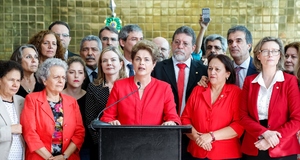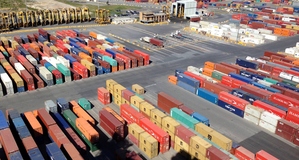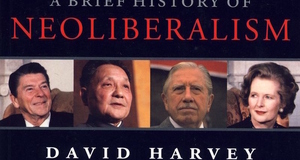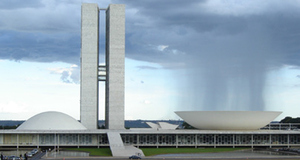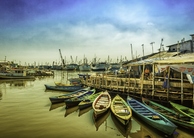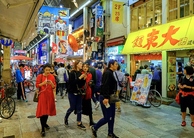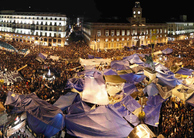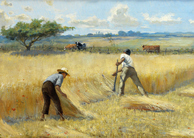From Cornell International Affairs Review VOL. 3 NO. 1Putting the B in the BRIC: Brazil's Rise as a Major Emerging PowerThe Future is Not Just Soccer and CarnavalBrazil’s recent stability and accomplishments in foreign policy do grant it the title of Latin America’s most powerful nation. Nonetheless, there are six other factors that can now (and in the near future) make its status as a rising major power even stronger. First, Brazil has, as one of its greatest assets, its natural resources. Brazilian soil is extremely fertile, the land is relatively flat, and fresh water is abundant. It comes to no surprise then that Brazil is currently the world’s largest produce of beef, poultry, coffee, sugar and ethanol. The Amazon forest, although mismanaged, is still the world’s largest ecosystem; opportunities for sustainable development and carbon trade are privileges Brazil can profit on at anytime. It is also worthwhile to mention that Brazil is immune to natural disasters like earthquakes, volcanoes and hurricanes. All of these factors allow the country to become a great player in the commodity market. Brazilian Vale S/A, for instance, now uses its status as the world’s second largest mining company to stipulate prices that clients (like China) have to pay for iron ores. 12 In addition, Brazil recently discovered a humongous oil reserve right off of its coast. Labeled as pré-sal (pre-salt), this reserve sits under a layer of salt that is several kilometers thick, and it holds about 5 to 8 billion barrels of oil. 13 With the prospects of oil revenue, Brazil already created its own sovereign fund, and private investments in infrastructure and technology are booming. As developing countries grow and consume more, Brazil will profit from being one of the world’s main suppliers of raw materials. Secondly, Brazil’s cultural and historical background makes it a cohesive and relatively peaceful nation. Unfortunately, violence is still very present in day-today life. Cities like Rio de Janeiro do have drug warlords dominating the slums, and authorities are still very unprepared to deal with the situation. Nevertheless, this violence arises due to socio-economic factors. A thief will rob or kill because he is poor, uneducated, and unemployed; if they have no hope of moving up in life, crime would most likely be their last resort. The situation may at times be dire, but economic development and proper education could reduce these crime rates. This is not the case with some other nations. The Russians cannot apply the same rationale to resolve their issue with the Chechens, nor can China with the Tibetans. Brazil has no Georgia, no Taiwan and no Kashmir. It has no nuclear weapons, and no historical tension with any other nation abroad. In fact, the closest Brazil gets to an international conflict is when it plays soccer with its longtime archrival Argentina. Third, Brazil’s current democratic regime is considered legitimate. Historically, Latin American politics have a tendency to be extremely volatile. It always seems that with every new politician, fake promises, corruption and exploitation reappear. The last two administrations, however, have proven that this condition is not universal. The two past Brazilian presidents came from opposing parties and had disparate ideologies, but they still knew the importance of legitimizing the newly established democracy. Brazil did not succumb to populism like Venezuela or Bolivia, it does not face the possibility of a one-party system like Mexico, and it did not cave in to self-interested, oblivious leaders like Argentina. Despite the remaining political tension within the legislative and other spheres of power, the Brazilian democracy as a whole is more consolidated. Fourth, Brazil emerges out of this economic meltdown more resilient than before. Unlike what happened in previous years, this crisis passed by relatively swiftly in Brazil. The drops in the financial and real economies happened, but they did not last long. São Paulo’s Bovespa/BM&F is now the world’s fifth largest stock exchange and its main index, the Ibovespa, has already returned to pre-crisis levels. In fact, the largest IPO of 2009 to this date came from a multinational headquartered at Brazil.14 Brazilian banks swam against the current, as they kept posting profits even at the peak of the downturn. The local financial system is relatively immune to what happened abroad because Brazilian banks are well-hedged, not too exposed to international markets, and then do not take excessive risks. In fact, banks benefit from the new healthy increase in domestic consumption and credit. As to the real economy, the effects of the crisis also seem to fade away. Industry and agriculture, which depended more on exports, took a heavy hit, and this lead to many lay-offs. Expectations, however, proved to be worse than the reality. Businesses are re-hiring their former employees and, in some cases, even increasing their workforce. Consequently, Brazil posted in September of 2009 an unemployment rate of 7.7%, lower than that of the US.15 Fifth, Brazil already demonstrates certain virtues typical of developed powers. More than half of its electricity comes from carbon-free hydroelectric plants, and around three-quarters of the news cars sold are biofuel. Ethanol is one of Brazil’s greatest economic and environmental assets. Unlike the corn ethanol produced in the US, Brazilian ethanol comes from sugar cane. The advantage of this variety is that it is cheaper, more efficient and it uses a raw material not vital for humans (and thus, not affecting food supplies).16 A popular misconception is that Brazilian farmers deforest the Amazon to create space for more sugar cane fields; in reality, most plantations are located thousand of miles away in the São Paulo state and new farms emerge in unpopulated open plains southeast of the Amazon. Another strong trait Brazil has is the power of its private sector. Not only do Brazilian banks, oil, mining and construction companies rank highly compared to its foreign counterparts, but other industries also show rapid development domestically and abroad. Embraer (which was once owned by the state) is now the world’s third largest airplane manufacturer, while the Belgian-Brazilian InBev recently purchased Budweiser, America’s largest beer company. Brazilian capitalism now flourishes stronger than ever, ready to succeed in a competitive and globalized world. Sixth, Brazil’s image abroad grants it a degree of soft power. Brazilian culture, soccer and lifestyle generally interest and appeal to people. It attracts immigrants and tourists from abroad, and having a good reputation is key for a state to convene its power. Moreover, Brazil also profits on its own image abroad; the brand “Brazil” sells various commodities, like flip-flops and soccer jerseys. Not surprisingly, this soft power may have influenced the global community in awarding the 2014 FIFA World Cup to Brazil and the 2016 Summer Olympics to Rio de Janeiro. This appeal attached to Brazil’s image is constantly reflected in its international interactions. Brazilians feel welcome anywhere they go, and most people associate their first thought of Brazil to something positive. That might also account for why few (if no) states view Brazil as an enemy. In fact, Brazil is a rare case of a nation who is rising without making other nations feel bothered or insecure. Brazil’s charisma and relatively untainted reputation are definitely unique assets few other developing countries possess. ConclusionThe current state of Brazilian economy and politics does consolidate it as an emerging major power. Despite all of the challenges it still has to overcome, everything seems to be working in Brazil’s favor. Its recent stability on both the economic and political fronts make it stand above many other developing countries. Not only that, but Brazil’s impact abroad and its domestic qualities make it stand out even more. In 2010 Brazil will once more hold elections and a new president will emerge. The top two candidates (one of whom has a PhD in Economics from Cornell) come from opposing parties, and possess different views on what the government should do. What they do share, though, is the vision of Brazil as a global leader. Regardless of the outcome of this election, it is very unlikely that Brazil will derail. A lot still has to change and Brazil should not get ahead of itself, but for now it can claim that its ascension to the pantheon of major powers is legitimate. Endnotes
Photo Courtesy of:
Suggested Reading from Inquiries Journal
Inquiries Journal provides undergraduate and graduate students around the world a platform for the wide dissemination of academic work over a range of core disciplines. Representing the work of students from hundreds of institutions around the globe, Inquiries Journal's large database of academic articles is completely free. Learn more | Blog | Submit Latest in Economics |









